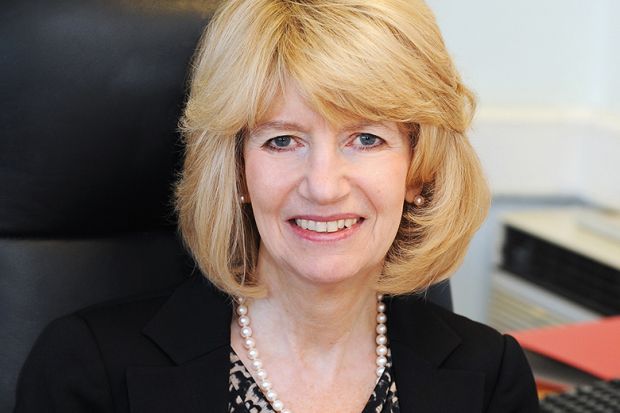The new president of Universities UK has said that she aims to counter policy focus on graduate earnings by communicating to the public that the value of a degree is “not all about earning money”, and to secure funding protection at a time of political uncertainty.
Brunel University London vice-chancellor Julia Buckingham, who set out with the ambition to become a concert pianist and then worked in the pharmaceutical industry before academia drew her in, spoke to Times Higher Education after starting her two-year term as president last month.
One key front for UUK, which represents universities in talks with the government, will be the future of funding in England, with ministers expected to reject the Augar review’s recommendation to lower fees to £7,500.
Ahead of an imminent election, the three major political parties in England have “different views on funding”, said Professor Buckingham.
“What matters to universities is that the unit of resource is protected,” she said. “We can’t deliver high-quality programmes unless we have an appropriate level of resource.”
Another key issue raised by the Augar review, she continued, was the question of how “the value of a degree” is defined (the review has been criticised for its focus on graduate earnings by course and university).
A recent UUK survey of student views on value found that earnings were not students’ top priority when choosing their courses, Professor Buckingham said. “They were actually interested in the subject, the learning, the environment, the broader value you get from university,” she said
Brunel’s graduate earnings figures were “very good and we have significant added value, if you look at the entrance qualifications [against] earnings”, said Professor Buckingham.
But, cautioning against solely focusing on earnings, she said that Brunel educates “occupational therapists, nurses, teachers and a lot of our students aspire to do jobs that they see as socially valuable”.
A UUK working group is examining this question of defining the value of degrees and will seek a range of views, including from students.
After that work, the key task will be communicating its findings to policymakers and the public, said Professor Buckingham. “We are a world-leading sector and I don’t think we do enough at the moment to talk to people about how incredibly valuable education is,” she said. “Education transforms lives and it’s not all about earning money.”
She added of that mission: “We have to communicate beyond the people we normally communicate with.”
UUK’s MadeAtUni campaign, which bills itself as showing the general public “the impact of universities…on people, lives and communities”, has been “getting somewhere”, said Professor Buckingham. “What I’d like a better understanding of is where it’s getting, so we can get that narrative out to people of what research is really about,” she said.
On another priority area, she argued strongly against the Augar review’s recommendation to end loans for students taking university foundation years, which she said provided access for disadvantaged students more successfully than other routes.
On Brexit, Professor Buckingham said that UUK was “in constant contact with the government” about the importance of protecting current EU staff and students, as well as securing future mobility and maintaining the UK’s involvement in EU research programmes. She added: “Research networks take a long time to develop; they can be destroyed quite easily.”
Back in her teens, Professor Buckingham’s original ambition was to be a concert pianist, before she realised she “wasn’t quite good enough”.
In the latter stages of A levels she encountered an “absolutely inspirational biology teacher who had just finished her PhD and was very keen to tell us all about her research”, prompting her to turn down a university place to study medicine and opt for a degree in zoology at the University of Sheffield.
“I absolutely loved the city,” Professor Buckingham said. “It’s a civic university: the university loved the city and the city loved the university.”
On graduating, she worked for the drug company now known as GlaxoSmithKline. But after discovering that pharmaceutical research at that time was “pretty dull” and she “wasn’t going to get anywhere without a PhD”, she took a doctorate at the University of London.
“I loved research, but I also found when I did my PhD that I loved teaching,” she said. That led to a career as an academic at Imperial College London, where she studied the neurobiology of stress and how challenges to the immune system influence the body’s stress response, before a switch into management as a pro-rector.
At Brunel, one of her ambitions is “that we become a proper civic university for Hillingdon”, the institution’s west London borough, which she described as “culturally diverse”, with “some really deprived areas”.
Noting Brunel’s breadth of student and course diversity, she said: “Universities should open doors for people. But the doors should be [to] careers that are going to be rewarding to [individual graduates] and of value to society very broadly.”
POSTSCRIPT:
Print headline: Public must know degree value ‘not all about money’
Register to continue
Why register?
- Registration is free and only takes a moment
- Once registered, you can read 3 articles a month
- Sign up for our newsletter
Subscribe
Or subscribe for unlimited access to:
- Unlimited access to news, views, insights & reviews
- Digital editions
- Digital access to THE’s university and college rankings analysis
Already registered or a current subscriber? Login








